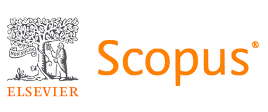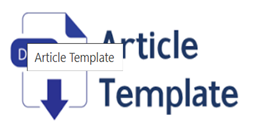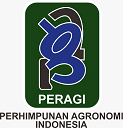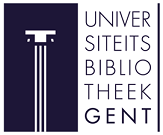Effectiveness of the Independent Farmer Card Program and its Impact on Farmer Welfare
Abstract
Every policy program that is made needs to be evaluated in order to know its successes and shortcomings, one of which can be done by measuring its effectiveness. This study was conducted to analyze the effectiveness of the independent farmer card and its effect on improving farmers' welfare. It is a study that uses a quantitative approach. The sample was selected using random sampling using the Slovin formula so that 100 respondents were obtained. Data analysis was conducted using Structural Equation Modeling-Partial Least Square (SEM-PLS). The results showed that the effect of the CIPP Model on the effectiveness of the Independent Farmer Card Program (KPM) in Bojonegoro Regency showed positive results. Factors such as monitoring, objectives, socialization, and targeting accuracy of the program contribute to its effectiveness. In addition, improvements in each component of the CIPP Model (Context, Input, Process, Product) were shown to increase the program's effectiveness, which also significantly impacted the welfare of farmers in the area.
Keywords
Full Text:
PDFReferences
Abdillah, W., Hartono, J., & Prabantini, D. (2021). Partial Least Square (PLS): Alternatif Structural Equation Modeling (SEM) dalam Penelitian Bisnis. Penerbit: Andi.
Arikunto, S. (2020). Manajemen Penelitian. Rineka Cipta.
Arikunto, S., & Jabar, A. (2019). Evaluasi Program Pendidikan . Bumi Aksara.
BPS. (2023). Hasil Pencacahan Lengkap Sensus Pertanian 2023 Kabupaten Bojonegoro . Katalog/Catalogue: 5106043.3522. Badan Pusat Statistik.
BPS. (2024). Produk Domestik Regional Bruto Kabupaten Bojonegoro Menurut Lapangan Usaha 2019-2023. Katalog/Catalogue: 9302021.3522. Badan Pusat Statistik.
F. Hair Jr, J., Sarstedt, M., Hopkins, L., & G. Kuppelwieser, V. (2014). Partial least squares structural equation modeling (PLS-SEM). European Business Review, 26(2), 106–121. https://doi.org/10.1108/EBR-10-2013-0128
Hariyanti, F., Syahza, A., Zulkarnain, & Nofrizal. (2022). Sustainability of the Palm Oil Industry: An Empirical Study of the Development of Sustainable Oil Palm in Bengkalis Regency, Indonesia. International Journal of Sustainable Development and Planning, 17(1), 109–118. https://doi.org/10.18280/ijsdp.170110
Ishak, F. N. A., Che’ Rus, R., & Che’ Rus, R. (2019). Assessment of Effectiveness My Kampung My Future Program Based on CIPP Model: Process Dimension. International Journal of Academic Research in Business and Social Sciences, 8(10), 1586–1592. https://doi.org/10.6007/IJARBSS/v8-i10/5827
Ishak, F. N. A., Rus, R. C., & Aminudin, S. I. M. (2017). Evaluation of My Kampung My Future Program Effectiveness Based on CIPP Model. International Journal of Academic Research in Business and Social Sciences, 7(10), 662–666. https://doi.org/10.6007/IJARBSS/v7-i10/3421
Kasmin, Muh. O., Helviani, H., & Nursalam, N. (2023). Identifikasi Komoditas Hortikultura Basis dalam Perspektif Pertanian Berkelanjutan di Kabupaten Kolaka, Indonesia. Agro Bali : Agricultural Journal, 6(1), 211–217. https://doi.org/10.37637/ab.v6i1.1043
Maulidah, S., Koestiono, D., Dina Riana, F., & Author, C. (2020). Improving The Sustainability Of Livelihood Assets As A Strategy For Paddy Self-Sufficiency : A Case At Rural Hoeseholds In Indonesia. PJAEE, 17(6), 9486–9494. https://archives.palarch.nl/index.php/jae/article/view/2491/2433
Maulidah, S., & Wahib Muhaimin, A. (2021). Sustainable Business Models: Challenges on potato agro-industry SMEs. IOP Conference Series: Earth and Environmental Science, 709(1), 012082. https://doi.org/10.1088/1755-1315/709/1/012082
McCoy, M., & Hargie, O. D. W. (2001). Evaluating evaluation: implications for assessing quality. International Journal of Health Care Quality Assurance, 14(7), 317–327. https://doi.org/10.1108/09526860110409081
Mukhtar, Ali, H., & Mardalena. (2016). Efektivitas Pimpinan: Kepemimpinan Transformatif dan Komitmen Organisasi.
Pantouw, S. ., Ngangi, C. R., & Lolowang, T. F. (2017). Evaluasi Pelaksanaan Program Pengembangan Kawasan Minapolitan Dengan Model CIPP (Contex, Input, Process, Product) Di Kota Bitung. AGRI-SOSIOEKONOMI, 13(3A), 95–118. https://doi.org/10.35791/agrsosek.13.3A.2017.18031
Parel, P. C., Caldito, C. G., Ferrer, L. P., & Tan, H. R. (1973). Sampling Design and Procedures. Social Survey Research Design.
Pratiwi, K. R. I., Pascarani, N. N. D., & Winaya, I. K. (2016). Evaluasi Pelaksanaan Program One Village One Product (OVOP) dalam Pemberdayaan Masyarakat di Desa Pelaga, Kecamatan Petang, Kabupaten Badung. Citizen Charter, 1(1), 1–9.
Prawoto, N., & Selatan, J. L. (2009). Memahami Kemiskinan Dan Strategi Penanggulangannya. Jurnal Ekonomi Dan Studi Pembangunan, 9(1), 56–68.
Putri, R. O., Widiyaningrum, I., Perencanaan, B., Daerah, P., & Bojonegoro, K. (2021). Impact Evaluation Kartu Petani Mandiri (KPM) terhadap Eksistensi Kemiskinan Kabupaten Bojonegoro di Era Pandemi Covid-19. Prosiding Seminar Nasional Penanggulangan Kemiskinan, 1(1), 157–167.
Rus, R. C., Kamis, A., & Ishak, F. N. A. (2018). Assessment of My Kampung My Future Program Based on CIPP Assessment Model: Input Dimension. International Journal of Academic Research in Business and Social Sciences, 8(10), 1256–1264. https://doi.org/10.6007/IJARBSS/v8-i10/5296
Sardjo, S., & L. D. (2016). Implementasi Model Evaluasi Formatif Program Pembangunan Sosial. Universitas Indonesia.
Satriawan, B., & Oktavianti, H. (2012). Upaya Pengentasan Kemiskinan Pada Petani Menggunakan Model Tindakan Kolektif Kelembagaan Pertanian. Jurnal Ekonomi Pembangunan: Kajian Masalah Ekonomi Dan Pembangunan, 13(1), 96–112. https://doi.org/10.23917/jep.v13i1.185
Sawerah, S. (2012). Evaluasi Pelaksanaan Program Pengembangan Usaha Agribisnis Perdesaan Pada Usahatani Padi di Desa Sungai Duri II Kecamatan Sungai Kunyit Kabupaten Pontianak. Jurnal Sains Mahasiswa Pertanian, 1(1), 1–9.
Sutarni, S., & Fitri, A. (2023). Analisis Kelayakan Finansial Usahatani Padi Sawah tanpa Pestisida Kimia. Agro Bali : Agricultural Journal, 6(1), 218–230. https://doi.org/10.37637/ab.v6i1.1168
Tayibnapis, F. Y. (2000). Evaluasi Program. PT Rineka Cipta.
Umar, H. (2005). Riset Sumber Daya Manusia. PT Gramedia Pustaka Utama.
Yuriani, Y., Komariah, K., & Sampurno, Y. G. (2015). Evaluasi Program Kewirausahaan Desa Dan Kota Dalam Pengentasan Pengangguran. Jurnal Penelitian Humaniora, 17(1), 98–112. https://doi.org/10.21831/hum.v17i1.3084
Refbacks
- There are currently no refbacks.

























